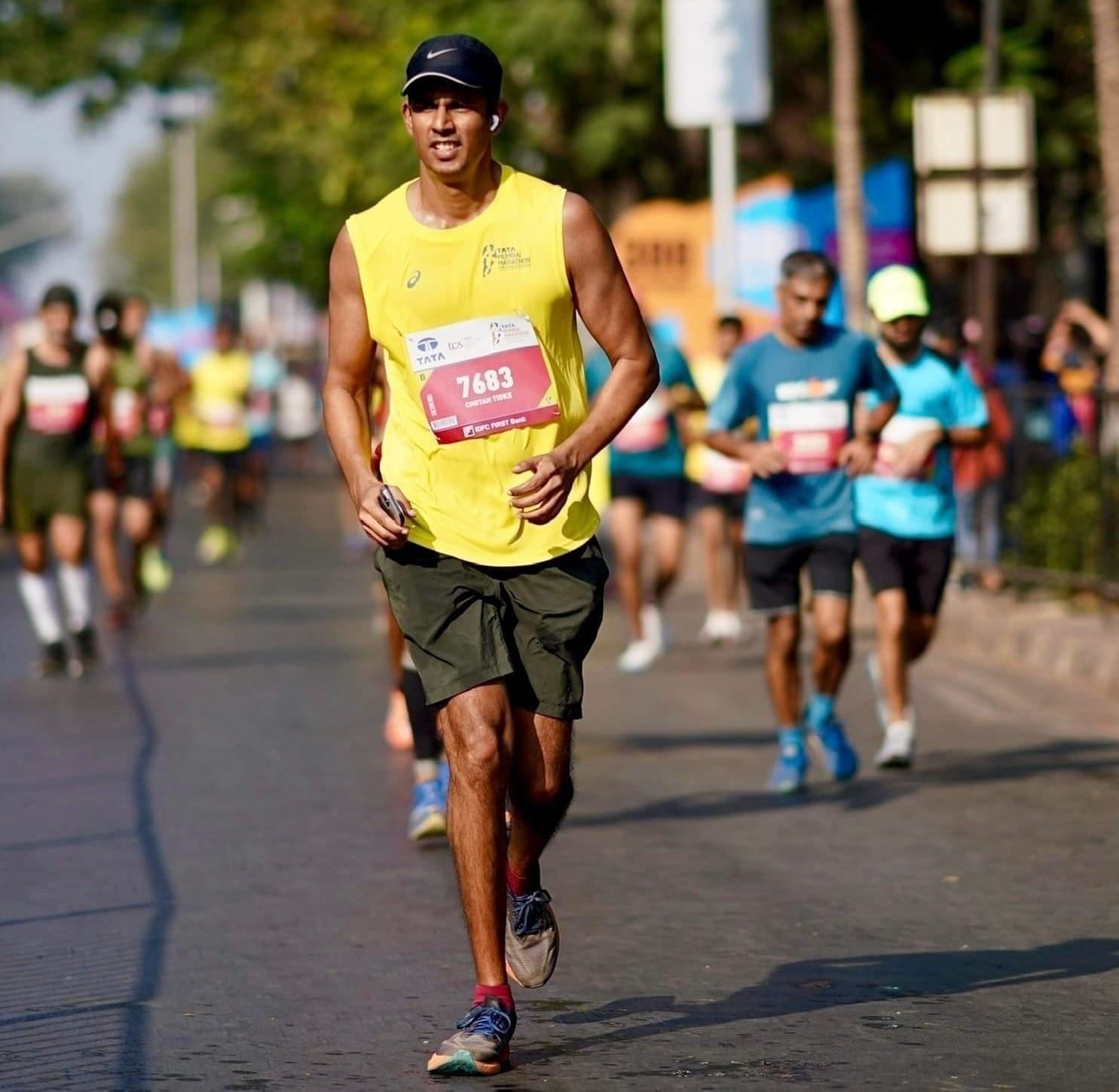The story of becoming a Marathoner

In January 2023, I couldn't participate in the Tata Mumbai marathon as the registrations were closed when I came to Mumbai and learned about it. Still, I wanted to cheer the amazing participants, and collectively celebrate with thousands of others who had also come out of their houses to cheer the 55 thousand people who were running that day. Witnessing the diverse array of runners—men and women spanning various age groups, some in their 60s and 70s, some running barefoot, others proudly carrying the tricolour flag—was truly uplifting. Their enthusiasm and determination, as they tackled the daunting 42.195 km distance, sparked a newfound ambition within me. At that moment I knew I had to run the same distance next year, it felt daunting, but at the same time, I was excited to feel those emotions that the runners were going through, and experience the feeling of finishing a distance like that.
At this point, I had been casually running 10-15 km on weekends, or when I was willing to prioritise running over other things. But gradually I realised that preparing for a full marathon while balancing a demanding career in strategy consulting, would require a significant lifestyle adjustment. Sacrificing Friday and Saturday night social outings and abstaining from alcohol to ensure I had the energy and discipline for long runs the next day became the priority and much-needed lifestyle change. And that helped, I ran my first half marathon in March 2023, finishing at a pace I had targeted. Even though I struggled in the last 5-6 Km of the half marathon, I felt I was in the best fitness of my life. But running a full marathon is not twice as difficult as running a half marathon, it is many times harder than that, with similar fitness now I would be struggling for 20-25 Km more, so preparing for a full marathon meant preparing the mind and body for a significantly higher duration of pain.
Over the ensuing months, I diligently increased my mileage, incorporating long runs on weekends and shorter distances during the week. I got comfortable running 20 km and progressively reached to a distance of 32 km in my training. But I was not always in the best shape during my preparation, I had to stop running for a couple of months, once when I got infected with malaria and had to stop intense workouts altogether for a month, and another time when my right shin was so badly hurt that I had to stop running again for a while.
With whatever preparation I had done, I had to make do with it, and I somehow knew I was going to finish the run as long as I didn't get injured while running during the actual race day. Even if I wasn't enough prepared physically, I hoped I could dig deep mentally to cross the distance. Plus, the love and blessings of my grandmother, who we lost recently, would be there throughout the run with me. Her love, support, care, and sacrifices have made us who we are and she will be in our hearts forever, being our lifeline. And I somehow felt more obliged to finish the run for her.
A day before the marathon I ate as much good carbs as I could, stayed hydrated, and did some stretches to relax my muscles. I slept at 8 pm as I was planning to wake up by 2 am. But somehow I woke at 1 am, I guess I didn't want to be late and the added excitement of the race day woke me up early.
21st January 2024, the day was finally here, the day I had envisioned multiple times in the past few months. I had visualised how I would run the course of 42.195 Km hundreds of times, and I knew the route as I had run on the same route many times, but I was still nervous at the same time, unsure if I would be able to keep up with my planned pace and avoid any injury during the run.
Injury or any other unforeseen scenario is very much probable in a course of running for 4-5 hours, and rightly, the number of hours of practice you put in before the race day determines how painful or easy the run would be. But no matter how many hours you put in, running a full marathon is a test of mental endurance, because it starts becoming painful for everybody who is running at some point. Most people who are running the marathon are running with a certain goal in mind, for some, the goal is to finish their first marathon, for others, it might be to finish it in a certain time, so practically everyone out there is trying to reach a certain goal and outdo themselves. That is the beauty of a marathon, while it is a collective sport, for most of the participants it's a race for themselves, everybody is trying to compete with their mental barrier and trying to be better than their previous selves. And yet it is somehow a shared feeling, as every participant can relate to what others are going through, and I think it is one of the most beautiful feelings while running a marathon - people cheering each other while struggling with their journey, cognizant of the fellow humans around and helping them.
Carrying all my learnings from the training, I reached the race start venue way before the start time of 5 AM. During the one hour before the start of the marathon, I was going through many emotions - confidence, excitement, nervousness, and joy, and I went through many more during the run. Around 56 thousand people were running various distances, and 9 thousand of them were running the full marathon. I had not thought that so many would be running the full marathon, but being around these many people who love the same sport was a remarkable feeling in itself.
I started the race at the pace of the people around me. There were thousands of people around and in front of me, so I had to tune in to the pace of the people and also didn't want to start at a faster pace. When I ran my last half marathon I ran at a very fast pace from the start and that left me with little energy during the last 5 km, given this was a full marathon, I had to be more careful about my pace during the whole run.
Running a marathon requires you to calculate and calibrate your pace throughout the course, depending on how your body is feeling at that particular time. A few seconds of a slow down in pace per km could lead to a difference of minutes or even an hour in your finish time, and when you are running it with a certain finish time in mind, you have to keep calculating and planning how you would compensate for the slow down.
The first 15 km of the marathon was a period of pure joy, I was running at a decent pace buoyed by the electric atmosphere, the rhythmic beats of drums and music, and the loud cheers of the people who had come out of their homes to show support. The atmosphere kept me wanting to dance, laugh and pace up, but I tried to keep my pace below my maximum potential pace, as I knew the real marathon would start in the second half and I needed to manage my energy accordingly.
16 to 21 km of the route was on the Bandra-Worli Sealink and that was a once-a-lifetime experience. I had run on the Dadar, Bandra, and Worli coastal routes overlooking the sea link so many times, dreaming about the Tata marathon day when I would get to run on the sea link, and realising that dream gave me a much-needed boost of energy. I was able to maintain the pace I was running at till now and was enjoying every step with thousands of other participants who were on the bridge with me.
Coming out from the sea link, half of the distance was over, but another 21 km was still left and that was not very comforting to think about. I was starting to feel some discomfort in my legs at this point, but nothing extremely challenging yet. If I could just keep up with the same pace I would have been able to finish the marathon in 4 hours, a time that I thought was not achievable with my current level of preparation. It would have been an insurmountable task to keep up with that same pace in the second half, so I managed my expectations and targeted a 4 hour 30 minutes, as finishing the marathon without an injury was a more important goal for me.
"During the last quarter of the marathon, it was a constant negotiation with my mind to endure the pain for a few more kilometres and keep reminding myself why I am running the marathon"
The 30-40 km of the marathon was the most difficult part, I was close to the finish line having completed three-quarters of a distance, yet so far from it, because there were still 12 km to go. My legs were feeling extremely heavy and every next step was becoming more difficult than the previous. Now I had to employ every trick in my sleeve I had learned in the past few years. I was slowing down rapidly after every kilometre, and I had to find a way to keep up. My legs were losing momentum so I started moving my arms faster in the hope of translating the rhythm to my legs. I started finding energy in the supporters who had come to cheer. I started empathizing with the person who was running next to me, going through a similar battle and yet not stopping. And these things pushed me to 40 km.
Now, I was in the last 2 km of the marathon, I was drained and exhausted, and yet not sweating anything, probably because I had sweat out everything I had in me in the last 40 Km. I rejoiced every moment during the last 2 km, there were so many people on the street of Marine Drive that the human cheers were loud enough to quench my body's cry for help to stop and I paced up during the last km.
Crossing the finish line, the 42.195 km mark, I was completely in a trance state, not able to realise what I had just achieved. I had imagined this moment hundreds of times, how I would feel and what I would do after crossing the line, but when the moment finally came I was completely calm. Though I was limping at every step after the marathon due to the amount of stress my legs had gone through, I felt comforted and warm in all the discomfort. I think it was the feeling that we all get after doing something difficult, achieving something that we wanted to do for so long, and realising it just makes us more peaceful and calm. After all, happiness is indeed peace in motion.

